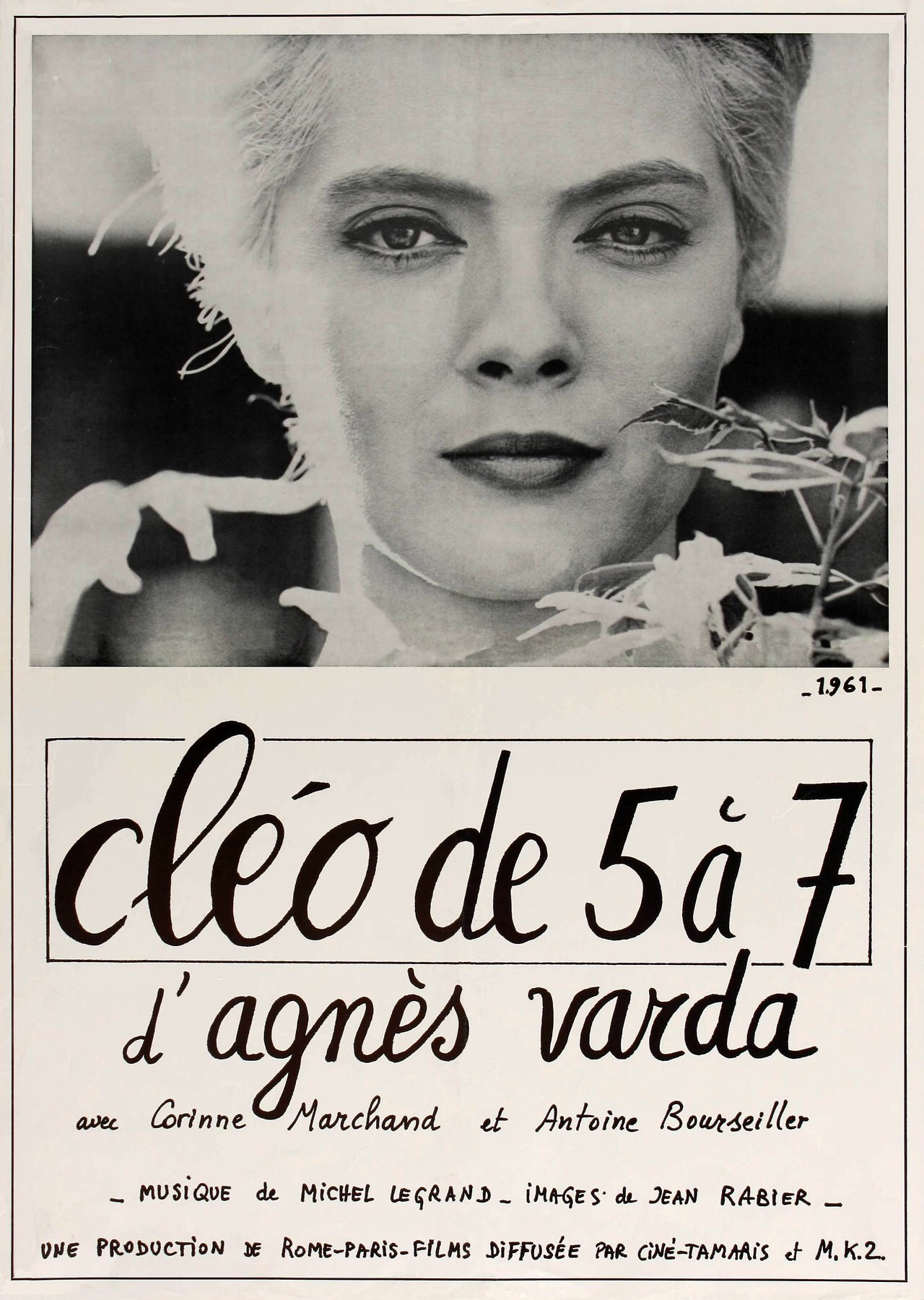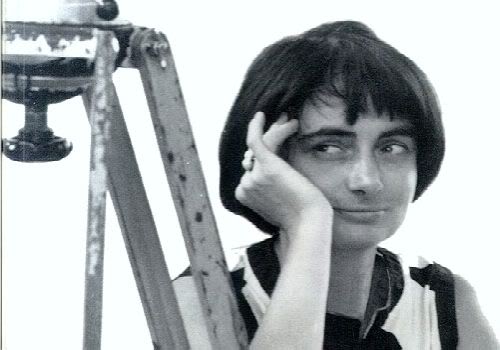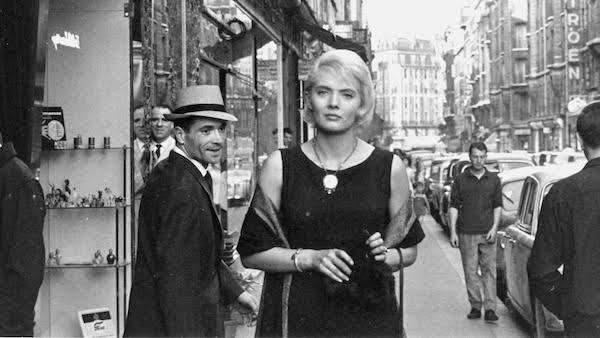Women's Pictures: Agnes Varda's Cléo From 5 to 7
 Thursday, June 11, 2015 at 1:30PM
Thursday, June 11, 2015 at 1:30PM  Cléo from 5 to 7 is easily Agnes Varda's most famous film. In a retrospective honoring Varda at the 2013 AFI Fest - my introduction to the dimunitive director - iconic photos of Corinne Marchand, ice cold in her black shades, were spread across signs and billboards on Hollywood Blvd. The highlight of the festival was a discussion with Varda before a screening of the film. During the discussion, Varda expressed disappointment that, of all her films, Cleo from 5 to 7 was the best-remembered. In a way, it's not so surprising. As Varda herself noted, the film was the result of a request by some of the New Wave directors that she make another fiction film in 1962. As a result, Cléo from 5 to 7 is actually the most easily categorizable film in Varda's ouvre. This is pure French New Wave, cerebral and cinematic, but containing those artistic flourishes that can only belong to Agnes Varda.
Cléo from 5 to 7 is easily Agnes Varda's most famous film. In a retrospective honoring Varda at the 2013 AFI Fest - my introduction to the dimunitive director - iconic photos of Corinne Marchand, ice cold in her black shades, were spread across signs and billboards on Hollywood Blvd. The highlight of the festival was a discussion with Varda before a screening of the film. During the discussion, Varda expressed disappointment that, of all her films, Cleo from 5 to 7 was the best-remembered. In a way, it's not so surprising. As Varda herself noted, the film was the result of a request by some of the New Wave directors that she make another fiction film in 1962. As a result, Cléo from 5 to 7 is actually the most easily categorizable film in Varda's ouvre. This is pure French New Wave, cerebral and cinematic, but containing those artistic flourishes that can only belong to Agnes Varda.
Cléo from 5 to 7 takes place over the course of a single afternoon, as a young singer (the eponymous heroine played by Corinne Marchand) waits to hear the results of a biopsy. Cleo is shallow, vain, and beautiful, kept by a rich gentleman who visits infrequently, and surrounded by sycophantic showpeople, superstitious assistants, and equally shallow friends. The mundanities of Cleo's life gain sudden symbolic importance with the shadow of death looming over her. A pop song becomes an anthem of discovery. A hat becomes an emblem of vanity. A walk down the street becomes a war between observer and observed. [More...]
This cinematic treatment of the mundane is a hallmark of the French New Wave, along with self-referential allusions to film (of which this movie has many) and a detached acting style which we first saw in La Pointe Courte. However, it is the plot's structure that is pure Varda.
As it turns out, the title is not just a pun based on a French saying about sex, it's also an explanation of the film's central conceit. The camera follows Cleo from 5pm to 6:30pm, taking place in "real time." Periodically, Cleo passes by a clock, so the time can be verified. However, this is more than a Rope-style gimmick; it's Varda's attempt to experiment with the vocabulary of film. As director Cristian Mungiu once noted, there's no other art that can portray how time flows. By confining Cleo's story to only one and a half hours, and refusing to leave her for even one second, Varda is showing how subjective something as rigid as time can be.
In order to keep the movie on time, Varda must employ a series of cinematic tricks. There are quick cuts, sped up scenes, and repeated frames, making Cléo from 5 to 7 appear to be more Cinematheque-experimental and less "documentary"-style than Varda's previous work. However, beyond aesthetics, this forces the film from a space of real time into a meditation on how time is experienced. Minutes can stretch and deja vu can strike when the suspense of oncoming bad news builds. Seconds can speed by when driving through town and laughing with friends. To focus purely on the structure of real time is to miss how highly subjective the film's use of time and space is.
Varda had proven herself to have a masterful eye with La Pointe Courte, but with Cléo she proved that she was a masterful storyteller as well. Though she came from a different approach than the rest of the New Wave auteurs, she was equally willing to turn film convention topsy turvy in order to redefine how movies were made. Though it was only her second fiction film, it remains her most popular. After 1962, Agnes Varda's career and body of work would only get more interesting.
This month on Women's Pictures...

6/18 - Le Bonheur (1965) - Varda's most provocative film tells the story of a married man's affair with a postal worker. (Hulu+)
6/25 - The Gleaners + I (2000) - Jumping forward in time and away in genre, this documentary was Varda's exploration of poverty in rural France. (Amazon Prime)




Reader Comments (8)
One of my favorite films, and you write about just a few of the things that make it special here, Anne Marie. Beautiful.
One of my favorite things about the film is that the pre-title sequence is in color - it only goes to black & white after Cleo's cards are read, after she believes she will die.
And enough good things cannot be said about "Sans toi", the gorgeous Michel Legrand song she sings as the centerpiece of the film.
denny - 600 words are not enough to cover everything that's going on in this film, unfortunately. How much Varda packs into 1 1/2 hrs is a little daunting. Thanks for pointing out two more amazing moments in the film!
A masterpiece, and one of the best films I can think of that articulates identity and the formation of self, the movement from a place of naiveté and solipsism to a burgeoning awareness of the world around you and your position as both subject and object in it. Very Lacanian - notice the constant use of mirrors, and mirrors upon mirrors that create nearly cubist spaces.
You write well on an important movie that as you know, manages to pack so much into such a short time. At the end we are left with an impression that outweighs the short running time.
Anne Marie- Really enjoy this series. I must have missed the post on where I might be able to find this film? I'm also wondering if the guy who put together that 24 hour clock movie a couple of years ago got some inspiration from Ms. Varda.
I saw this and Darling in the same week, years ago. A fine duo.
I love this movie so much. I bought it from Criterion on a whim and I was hugely rewarded.
Everyone pointed out so many amazing moments and qualities about this film. One of my favorite aspects of it is how as a director, Varda adopts different tones throughout with such ease, when in actuality there was a huge amount of skill and creativity behind it. Yet, those elements don't draw attention to themselves (like Tarantino/Godard sometimes), but rather complement the journey.